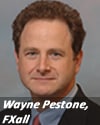Market participants have raised concerns with the Commodity Trading Futures Commission (CFTC) that the potential growth of swap futures could create an uneven playing field between swap execution facilities (SEFs) and futures exchanges.
Futurised swaps offer the economic equivalent exposure of swaps but are traded on existing futures exchanges - known as designated contract markets (DCMs) under Dodd-Frank, the US' overhaul of the OTC derivatives market.
The unintended consequences of swaps futurisation were raised at a public hearing held by the CFTC yesterday by a number of potential SEF operators, including FXall, an electronic FX trading platform owned by Thomson Reuters that has been working to convert into a SEF.
"The CFTC's implementation of the Dodd-Frank rules risk skewing the landscape between swaps and swap futures in a way that creates regulatory arbitrage, particularly in terms of margin and block trading thresholds," Wayne Pestone, chief regulatory officer, FXall, told theTRADEnews.com. "There is a danger that the benefits of the swap market will be overshadowed in this debate."
The CFTC roundtable was held in advance of the finalisation of the agency's SEF rules, which are expected by mid-February, according to commissioner Scott O'Malia.
At present, IntercontinentalExchange (for power and natural gas), CME Group and Eris Exchange (for interest rates) offer swap futures. The products were initially conceived so that brokers could avoid having to register as swap dealers by staying under the OTC derivatives trading threshold.
But in addition to avoiding swap dealer registration, swap futures offer lower initial margin obligations compared to OTC derivatives. Swaps require a five-day value-at-risk (VaR) initial margin requirement, compared to a one-day VaR for futures.
"Margin should be based on economic analysis of like products, not just because an instrument is described as a future or a swap," said Pestone. "Swap futures are being marketed and used as economic equivalents to swaps, so they should have like margin."
 Moreover, George Harrington, head of global fixed income trading at Bloomberg, suggested the implied risk and liquidity of swaps compared to futures had not been adequately assessed.
Moreover, George Harrington, head of global fixed income trading at Bloomberg, suggested the implied risk and liquidity of swaps compared to futures had not been adequately assessed.
"Today there is no question that there is significantly more liquidity in cleared financial swaps than in cleared financial swap futures," he said. "In that light, the establishment of a margining regime that favors financial futures over financial swaps runs the risk of increasing systemic risk."
"Gold standards"
However, Thomas Farley, senior vice president of financial markets, ICE, said swap futures represented "a higher standard of regulatory regime".
"Futures markets have been and remain the gold standard when it comes to regulated markets. In contrast to the swaps markets today, futures have real-time reporting and are traded and cleared on transparent exchanges," he said. "Swaps markets trade anywhere from bilaterally over the phone or via instant messaging services, to centralised electronic platforms and exchanges. Five-day margin may be appropriate given that a particular swaps market may not have a liquid market in which to liquidate a position."
Lower margin payments could lead to a migration of liquidity from the swaps market to futures equivalents, something that occurred in the energy market, the first to create swap futures products.
"Futurisation of energy derivatives has led to a draining of liquidity in some swaps markets. This is largely to do with uncertainty around Dodd-Frank, and where there was a higher bar for the trading of swaps," said Dan Smith, head of market development at Trayport. "But while some believe making OTC trading methods more difficult or expensive will lead to all trading moving on exchange, this is unlikely to be the case. Those that trade off-exchange are doing so because exchange central limit order book trading is inappropriate for their needs."
The deliverable interest rate swap futures products offered by CME - swaps instruments that morph into futures upon expiry - are still gaining traction. Although well received by customers, according to the CME, the volumes of contracts trading remains relatively low with between 2-3,000 contracts traded per day.
Wholesale shift
If a similar transition to futures occurs in interest rates and if other asset classes follow suit, would-be SEF operators are concerned their platforms would fail to attract liquidity.
"If there is a mass migration to swap futures, banks that have historically provided liquidity in the swaps market will move to futurised products as well," said Pestone. "This means that institutional investors that want a more tailored exposure through swaps will not have access to liquidity."
SEFs are also worried that DCMs currently have an advantage when it comes to block trading thresholds. DCMs can set their own limits for block trades - letting users benefit from less onerous pre- and post-trade transparency obligations - while SEFs have block thresholds determined by regulators.
"SEFs, like DCMs, are self-regulatory organisations," said Pestone. "Therefore, SEFs should be able to set their own block size limits as DCMs currently do. We want the opportunity to compete on a level playing field, not something that is artificially skewed by regulators."
All eyes will now be on the CFTC as it finishes drafting the rules for SEFs, with pressure from a number of market participants to ensure a level playing field.
 "If participants prefer futures to swaps, so be it, but it is disingenuous to suggest that swaps and futures are competing on a level playing field, with a neutral referee and neutral rules, with the outcome driven by product characteristics and user preferences," said Chris Ferreri, chairman of interdealer broker trade body the Wholesale Markets Brokers' Association Americas and managing director of hybrid markets at ICAP. "Even if futurisation is inevitable because of a natural migration to order books as swaps become more liquid, it still begs the question why greater liquidity must move to order books operated by single-silo non-fungible exchanges?"
"If participants prefer futures to swaps, so be it, but it is disingenuous to suggest that swaps and futures are competing on a level playing field, with a neutral referee and neutral rules, with the outcome driven by product characteristics and user preferences," said Chris Ferreri, chairman of interdealer broker trade body the Wholesale Markets Brokers' Association Americas and managing director of hybrid markets at ICAP. "Even if futurisation is inevitable because of a natural migration to order books as swaps become more liquid, it still begs the question why greater liquidity must move to order books operated by single-silo non-fungible exchanges?"
